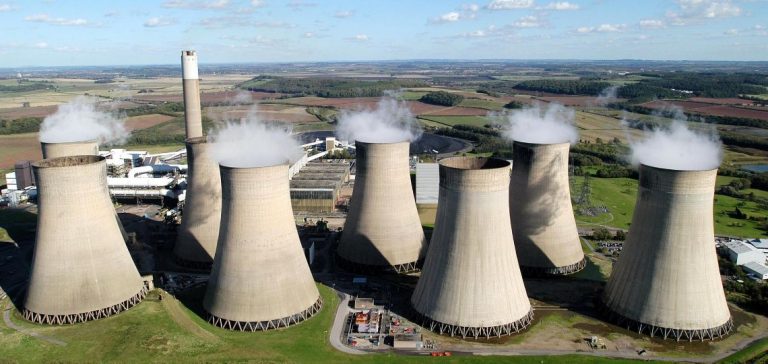The United Kingdom is closing a chapter in its history by shutting down its last coal-fired power plant, located in Ratcliffe-on-Soar. This decision is part of its energy policy, aiming to achieve a fully decarbonated electricity supply by 2030. This transition, initiated in the 1990s, has accelerated over the last few decades, gradually reducing the share of coal in the national energy mix, which was once dominant.
In 2023, coal accounts for just 1% of the UK’s electricity production, compared to nearly 70% in the 1980s. This sharp decline is explained by a series of regulations aimed at reducing air pollutants, as well as an industrial transformation that saw the gradual abandonment of manufacturing activities and a shift towards more flexible and less carbon-intensive energy sources.
A Strategy Focused on Renewable Energy
This closure is part of a broader strategy of transitioning to renewable energy. London recently announced the creation of *Great British Energy*, a public company aimed at supporting the development of strategic energy projects, particularly in the fields of offshore wind, tidal energy, and nuclear power. The British government is thus seeking to stabilize its grid while maximizing the share of low-carbon energy, in line with its decarbonation commitments.
This energy transition is also materializing through the acceleration of renewable energy projects. Currently, around 25% of the UK’s electricity production comes from wind, mainly offshore. The share of natural gas, which still dominates with a third of production, is expected to decline as new renewable capacities are integrated. The objective is to minimize dependence on fossil fuels while maintaining security of supply.
The First G7 Member to Close Its Coal-Fired Plants
The United Kingdom thus becomes the first G7 country to eliminate coal from its electricity mix. Other group members have not yet reached this stage. Italy plans to close its plants by 2025, followed by France in 2027. Canada is committed to phasing out coal by 2030, while Germany has set a target for 2038. As for the United States and Japan, they have not yet established a precise timeline.
This position as a pioneer among the world’s major economies is explained by London’s desire to establish itself as a leader in energy transition. The UK has leveraged its geographical advantage to quickly develop offshore wind power, an energy source considered more competitive and stable than coal-fired power plants. This strategy has been accompanied by a modernization of the electricity grid to absorb these new capacities.
Economic and Social Impact on Former Mining Regions
The closure of the Ratcliffe-on-Soar power plant, owned by Germany’s *Uniper*, is accompanied by a progressive conversion of the sites. The decommissioning plan includes the creation of a technology hub focused on decarbonated energy. These transformations have social consequences, especially for the 350 employees of the plant, whose jobs will be affected by the closure.
This transition dynamic is also observed in other industrial sectors of the country. The shutdown of the last blast furnace of *Tata Steel* in Port Talbot, Wales, reflects the transformation of the UK’s heavy industry. The steelworks, which once heavily depended on coal for its production, plans to switch to electric arc furnaces, which are less carbon-intensive. This transition represents a challenge for local workers, who are often low-skilled and struggle to retrain in new energy-related technologies.
The Role of the State in Modernizing the Grid
To support these changes, the United Kingdom has decided to nationalize *Electricity System Operator* (ESO), the operator of its electricity transmission network, for an amount of £630 million (€746 million). This nationalization aims to improve the efficiency of connections to new renewable infrastructures and strengthen the grid’s resilience in the face of the growth of intermittent sources such as wind and solar.
By centralizing grid management, the government aims to optimize the integration of new capacities while reducing bottlenecks that hinder the commissioning of new projects. The UK thus seeks to address the challenge of grid flexibility, a major issue for all countries undergoing energy transition.






















